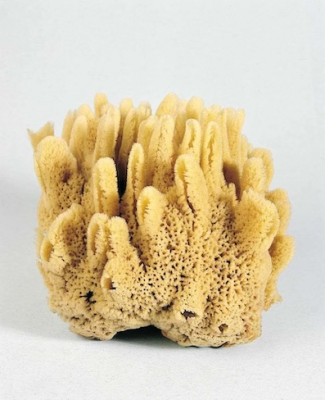Gospel in Art: Jesus went out to the mountain to pray

Spongia sp. Linnaeus, Collected in 1759, Sponge specimen in the collections of the © Natural Museum of Ireland, Dublin
Source: Christian Art
Gospel of 9 September 2025
Luke 6:12-19
In these days Jesus went out to the mountain to pray, and all night he continued in prayer to God. And when day came, he called his disciples and chose from them twelve, whom he named Apostles: Simon, whom he named Peter, and Andrew his brother, and James and John, and Philip, and Bartholomew, and Matthew, and Thomas, and James the son of Alphaeus, and Simon who was called the Zealot, and Judas the son of James, and Judas Iscariot, who became a traitor.
And he came down with them and stood on a level place, with a great crowd of his disciples and a great multitude of people from all Judea and Jerusalem and the seacoast of Tyre and Sidon, who came to hear him and to be healed of their diseases. And those who were troubled with unclean spirits were cured. And all the crowd sought to touch him, for power came out from him and healed them all.
Reflection on the Antique Sponge
Time and time again we read all throughout the Gospels that Jesus constantly prayed. His life was steeped in prayer. If I may put this image to you: our faith is a little like a dry sponge. At first it may seem fragile, empty, and easily overlooked. Each prayer we whisper, each line of Scripture we read, is like a single drop of water falling upon it. One drop alone appears small, almost too small to make a difference. But over time, as those drops keep falling, the sponge begins to soften, to swell, to take on life. Slowly but surely, we become soaked in God!
So it is with our hearts. If we are faithful to the discipline of prayer and Scripture-even in tiny daily moments-the Word of God seeps deep within us. Before long, we find ourselves soaked through with His presence, our lives dripping with the grace we have absorbed. What once seemed small and ordinary is revealed as transformative. A sponge cannot help but release water when pressed; so too, a heart steeped in God's Word cannot help but pour His love into the world.
Today's object is not the work of a human hand but a creation of nature itself. Dating from 1759 and now housed in the National Museum of Ireland, this specimen is a reminder that nature produces the most beautiful works of art. Each sponge, with its intricate form, can be admired as a sculpture in its own right: beautiful in its symmetry, shape and refinement. Early naturalists, struck by their shape and immobility, once classified sponges as plants. It was only in 1795, when their unique method of feeding was observed, that they were finally recognised as animals. Sponges are fascinating creatures. They multicellular animals that survive by circulating water through an elaborate system of internal canals, filtering out tiny food particles. Thus they are animal, rather than plant.
Around 5,500 species are known today, ranging from the familiar bath sponge, harvested for human use, to giant species found in the reefs of the Caribbean and even the icy waters of Antarctica, some growing more than two metres tall. Both delicate and resilient, sponges reveal the artistry of creation and remind us that beauty is often found in the most unexpected forms of earthly life.
LINKS
Gospel in Art: https://christian.art/
Today's Reflection: https://christian.art/daily-gospel-reading/luke-6-12-19-2025/

















